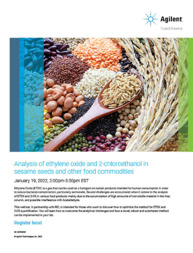Brazilian Cerrado wheat: Technological quality of genotypes grown in tropical locations.
Brazilian Cerrado wheat: Technological quality of genotypes grown in tropical locations.
Autoria: OLIVEIRA, M. E. A. S.; ALVES, T. O.; GUTKOSKI, L. C.; MIRANDA, M. Z. de; FERREIRA, M. S. L.; TAKEITI, C. Y.
Resumo: Brazilian Cerrado wheat has emerged as an alternative to expand a new agricultural frontier in tropical areas. In this study, technological quality of 34 samples grown in five locations situated in the Cerrado Mineiro was evaluated in terms of their grain, flour, and starch properties. Damaged starch was positively (p < .05) correlated with Single Kernel Characterization System parameters (r = 0.578) and pasting properties (r = 0.761), and negatively (p < .05) correlated with enthalpy (r = −0.400) and relative crystallinity (r = −0.379). The irrigation system strongly influenced the starch characteristics, rheological, and pasting properties. Piumhi location showed the highest mean of resistant starch (0.80 g/100g), bringing an interesting prebiotic appeal to these samples. Gluten index (mean = 90.6) and damaged starch (mean = 5.0%) values showed that genotypes present suitable standards for bakery products. This pioneering study highlights promising agronomic materials for cultivation in the Brazilian Cerrado region, which has great potential to produce tropical wheat. Practical applications Wheat is the second most significant staple grain after maize, constituting a strategic role in food security to the world economy. In Brazil, more than 90% of wheat is grown in traditional areas that include subtropical climates. In this scenario, Brazilian Cerrado has been standing out as a potential region for wheat cultivation to produce improver wheat class that is the main consumer-driven market. Wheat culture has been adapted under Cerrado conditions after massive investments regarding genetic improvement and integrated soil?water? nutrient? plant practices that allow high grain productivity. Thus, the characterization of wheat grain associated with flour rheological evaluation and starch profile is effective in predicting processing behavior and applicability in different bakery products. The results showed that irrigation system strongly influenced the rheological and pasting properties of starch. These samples showed suitable contents of dry gluten 11%?14%) and damaged starch (4.5%) for bakery products development.
Ano de publicação: 2021
Tipo de publicação: Artigo de periódico
Unidade: Embrapa Trigo
Palavras-chave: Amido, Farinha de Trigo, Flour, Food processing quality, Grain, Grain foods, Grão, Maize, Produto de Origem Vegetal, Starch, Tecnologia de Alimento, Trigo, Vegetable products, Wheat, Wheat flour quality
Observações
1 - Por padrão são exibidas publicações dos últimos 20 anos. Para encontrar publicações mais antigas, configure o filtro ano de publicação, colocando o ano a partir do qual você deseja encontrar publicações. O filtro está na coluna da esquerda na busca acima.
2 - Para ler algumas publicações da Embrapa (apenas as que estão em formato ePub), é necessário ter, no celular ou computador, um desses softwares gratuitos. Sistemas Android: Google Play Livros; IOS: iBooks; Windows e Linux: software Calibre.
Acesse outras publicações
Acesse a Base de Dados da Pesquisa Agropecuária (BDPA) para consultar o acervo completo das bibliotecas da Embrapa.

